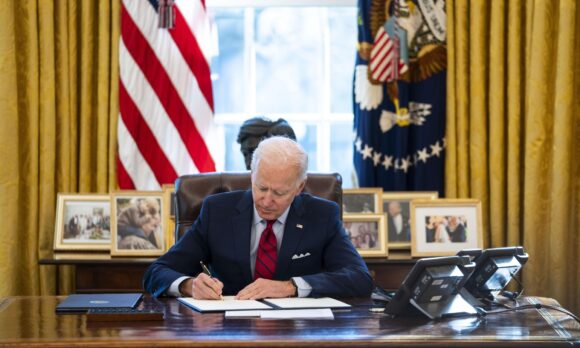May 19, 2021
Sharper: Israeli-Palestinian Diplomacy
Analysis from CNAS experts on the most critical challenges for U.S. foreign policy.
In recent days, Israel and Palestine have been overcome by the worst violence since the 2014 Gaza war. This flare-up poses the first real test to the Biden administration’s foreign policy toward the conflict. As COVID-19, domestic crises, and competition with China remain top priorities for the U.S. government, what role should the United States play in de-escalation between Israel and Palestine? CNAS research and experts provide valuable context and sharpen the conversation about the Israeli-Palestinian conflict.
Features
A New U.S. Strategy for the Israeli-Palestinian Conflict
Today’s realities demand that the United States change its approach to the Israeli-Palestinian conflict. Its focus has been on high-profile diplomatic initiatives that aim for a permanent agreement in which the United States is the central mediator. In a CNAS report, Ilan Goldenberg, Michael Koplow, and Tamara Cofman Wittes write that instead, the United States must focus on taking tangible steps, both on the ground and diplomatically, that will improve the freedom, prosperity, and security of all people living between the Mediterranean Sea and the Jordan River, while also cultivating the conditions for a future two-state agreement negotiated between the parties.
Ending Gaza’s Perpetual Crisis
A task force between CNAS and Brookings Institute experts examined U.S. options for addressing the ongoing crisis in the Gaza Strip. The authors of a subsequent report—Hady Amr, Ilan Goldenberg, Kevin Huggard, and Natan Sachs—recommend a new U.S. policy toward Gaza that will not require a fundamental shift in objectives, but will demand a major change in the strategies and tools the United States uses to achieve its goals, as well as greater American engagement.
The Case Against Foreign Policy Solutionism
"In the Middle East, the new administration has criticized the Trump plan for an Israeli-Palestinian settlement as one-sided and wholly unrealistic, and Biden advisers have advocated for a more evenhanded approach that would build momentum toward a two-state solution," writes Richard Fontaine in Foreign Affairs. "Unfortunately, however correct those criticisms of the Trump approach, other comprehensive plans are unlikely to be much more successful than the Trump administration’s attempt to unlock 'the deal of the century.'"
A New U.S. Strategy for the Israeli-Palestinian Conflict
Executive Summary Key Proposition Today’s realities demand that the United States change its approach to the Israeli-Palestinian conflict. Its current focus is on high-profile...
Ending Gaza’s Perpetual Crisis
Executive Summary Situation Overview A crisis is unfolding in the Gaza Strip. Its nearly 2 million residents live amid a man-made humanitarian disaster, with severe urban cr...
The Case Against Foreign Policy Solutionism
Not all problems can actually be solved—and many of today’s foremost foreign policy challenges fall squarely into that category....
A Security System for the Two-State Solution
A report authored by current and former U.S. and Israeli military officials and negotiators argues that well-thought-through security measures in the context of the two-state solution can provide Israelis and Palestinians with a degree of security equal or greater to that provided today by Israel’s deployment into the West Bank, and that such measures can be consistent with Palestinian needs for sovereignty and dignity.
Demilitarizing U.S. Policy in the Middle East
"In every instance, policymakers tried to shift away from the region without having a coherent strategy for more cheaply and efficiently managing America’s limited interests," observe CNAS experts Ilan Goldenberg and Kaleigh Thomas. "When such an approach resulted in failure, each administration overcompensated and became too invested in the region. What is needed instead is a sustainable, limited, steady state approach to the Middle East."
Virtual Report Launch: A New U.S. Strategy for the Israeli-Palestinian Conflict
On December 16, 2020, the Center for a New American Security hosted a virtual panel discussion to coincide with the launch of a new report entitled A New U.S. Strategy for the Israeli-Palestinian Conflict, by Ilan Goldenberg, Michael Koplow, and Tamara Cofman Wittes. The authors argue that today’s realities demand that the United States change its approach to the Israeli-Palestinian conflict away from a focus on high-profile, U.S.-mediated diplomatic initiatives to achieve an Israeli-Palestinian permanent agreement.
A Security System for the Two-State Solution
Report outlines comprehensive security arrangements for Israelis and Palestinians based on six core principles and provides proposed solutions to all of the toughest security ...
Demilitarizing U.S. Policy in the Middle East
The next NDS must detail a new approach to the Middle East....
Virtual Report Launch: A New U.S. Strategy for the Israeli-Palestinian Conflict
Ilan Goldenberg, Michael Koplow, Tamara Cofman Wittes, Shibley Telhami
Dec 16, 2020
In the News
Featuring commentary and analysis by Ilan Goldenberg
What the Latest Fighting Between Israelis and Palestinians Means for Biden
To understand what the latest fighting means for Washington, Foreign Policy spoke to Ilan Goldenberg, who served as a senior State Department official in the Obama administrat...
Biden Takes Muted Approach To Violence In Israel And Gaza
Scott Detrow from NPR's Weekend Edition speaks to Middle East Security Program Director Ilan Goldenberg about the escalating conflict in Gaza. Listen to the full interview fr...
Middle East security director on the continued violence in Gaza, Israel
President Biden today called for de-escalation of violence in the Middle East. Ilan Goldenberg, Middle East Security Program Director at the Center for a New American Security...
Thank you for registering! You will receive a confirmation email shortly. All CNAS events are free, open to the public, and viewable from cnas.org/live.
Stay up-to-date with report releases, events, major updates, and announcements from the Center for a New American Security.
More from CNAS
-
America Is Pushing Its Security Ideas on a Lukewarm Middle East
Washington wants to connect its Middle Eastern partners in ways that deliver collective security benefits greater than the sum of any one nation’s military’s parts....
By Jonathan Lord & Arona Baigal
-
The Senate Is Dropping the Ball on Middle East Air Defense
Establishing a regional security framework in the Middle East would be a breathtaking sign of progress, and the Senate cannot afford to trip out of the starting blocks....
By John O'Malley
-
Want more capable military partners? Empower and promote Foreign Area Officers.
When defense ministries in need of reform are left to their own devices, institutional weakness and corruption ultimately produces hollow armies....
By Jonathan Lord
-
Biden Can Keep the Two-State Solution Alive
Small details matter a great deal—and they have the potential to become big international headaches....
By Ilan Goldenberg










